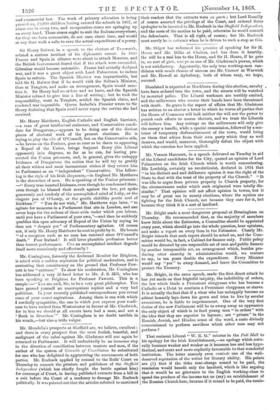Mr. Henry Matthews, English Catholic and English barrister, —a man
of great intellectual eminence, and Conservative candi- date for Dungarvan,—appears to be doing one of the dirtiest pieces of electoral work of the present elections. He is trying to play the role of O'Connell, but on the Conservative side, —he fawns on the Fenians, goes as near as he dares to approving a Repeal of the Union, brings Serjeant Barry (his Liberal opponent) into disgrace, so far as he can, for having pro- secuted the Fenian prisoners, and, in general, gives the unhappy Irishmen of Duugarvan the notion that he will try to gratify all their wildest and most inconsistent wishes if they return him to Parliament as an " independent " Conservative. The follow- ing is the style of his Irish eloquence,—in England Mr. Matthews is the shrewdest of men. lie is speaking of the Fenian prisoners : —" Every true-hearted Irishman, even though he condemned them, even though he blamed their revolt against the law, yet spoke generously and tenderly of the accomplished mind of Luby, or the elegant pen of O'Leary, or the gentle childlike poetic soul of Kickham !" " You do not wish," Mr. Matthews says later, " to agitate for measures in a Parliament that sits in London, and can never hope for the redress of those evils under which you labour, until you have a Parliament of your own,"—and then he suddenly qualifies this open advocacy of Repeal of the Union by saying he does not " despair yet" of Parliamentary agitation. Of course not, if only Mr. Henry Matthews be sent to profit by it. He boasts " of a reception such as no man has received since O'Connell's death." Poor Ireland ! It still loves plausible profession better than honest performance. Can an accomplished intellect degrade itself more consciously and effectually ?


































 Previous page
Previous page